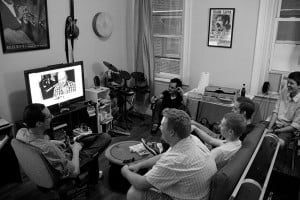
Last year when my band Oranjuly was planning the CD release for our debut album, I looked at the list of things that needed to be done and thought, “I wish we had a band intern.” Then I began thinking, “Why not? Helping to plan a CD release is real world experience for someone interested in learning about the music business and I could use an extra set of hands.” Trouble is, there aren’t many college students eager to work for a band. Not that it wouldn’t be fun; it just doesn’t look good on a resume. That’s when I got the idea to start Pretentious Indie Band Management.
To be a management company, however, I needed more than one band. I don’t have time to manage the day-to-day business of my own band, let alone a roster of artists, so I looked for DIY indie artists who could manage their own day-to-day stuff. To give us more credibility, I recruited bands from a variety of genres and experience levels. Bands like Beware Fashionable Women and The Radio Says had great success with music licensing, but didn’t play many live shows outside their local area. Conversely, Roman Traffic, Stereogrove and Neara Russell had great touring experience, but didn’t license as many songs for TV. At the time, my band Oranjuly hadn’t done much touring or licensing, but since I wasn’t charging anything for being a part of PiB I figured no one would mind if I put my own band on the roster.
Indie artists don’t need to be isolationist
By teaming up as a management company, we could pool our collective resources, experiences, and contacts to get the benefits of being part of a larger organization, while still maintaining our independence as artists.
I picked four areas for Pretentious Indie Band to focus on:
Licensing – With a professional website and artists with past placements on the roster, we could reach out to music supervisors directly and start building relationships with them.
Promotion – Thanks to a shared database of press contacts, allies to help build social media buzz and smart folks to bounce PR ideas around with, promoting a new album or show has been easier for everyone on the roster.
Sponsorship – With the combined successes and fan bases of our artist roster, we could approach companies for sponsorship to help lower tour costs (by targeting rental car companies, hotel chains, etc) or just get some free stuff (like gear or whatever else we could use).
Manpower – I recruited an intern to help the member bands with busywork (i.e. building databases, research, follow-up emails) and local promotion.
To make sure we remained productive, I declared the second Tuesday of every month “PiB Meeting Day.” After work, we get together to talk about what’s going on in each of our bands and discuss what we can do as a larger group. Anyone who can’t make it to the physical meeting location for pizza and beer can video conference in using Skype or Google+’s new Hangouts feature.
Even before we had achieved any of our larger goals, simply getting a bunch of smart DIY musicians together on a regular basis turned out to be a great way to get feedback on ideas, the dirt on a promoter, or an introduction to a new contact in the industry.
What you need to start your own management company
The main key to establishing any new business in today’s world is a website. Register your domain and build something simple (Tumblr is a great option for folks who don’t want to mess with HTML code). Also, don’t forget to set up email addresses at the domain as well (e.g. info@pretentiousindieband.com). I even took the extra step of setting up a phone number using Google Voice so everyone in the company could make calls and check voicemail through a single company phone number.
What to do when things get stuck
Sometimes it’s hard for a group of independent thinkers to make decisions. You could debate endlessly about what the website should say, what it should look like, etc. I’ve found the best formula to resolve such things is to ask for a volunteer to take a stab at putting something together. They can present what they’ve done to the group for feedback, but whoever’s doing the work has the final say.
What’s next for PiB?
Over the past year we’ve managed to drum up press for our artists’ shows, obtain sponsors for those shows, and establish relationships with a number of music supervisors. Collectively, we reach over 35,000 music fans through social networks, have played hundreds of shows in cities all over the world and have had our music placed in shows on CBS, ABC, MTV, HBO, and The History Channel.
For more information, please visit www.pretentiousindieband.com.
photo by Liz McBride